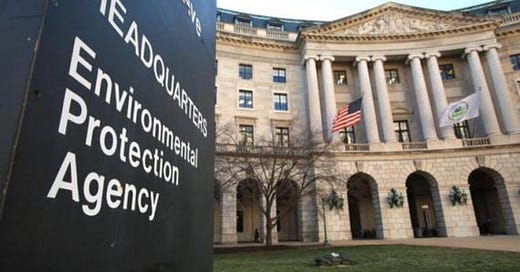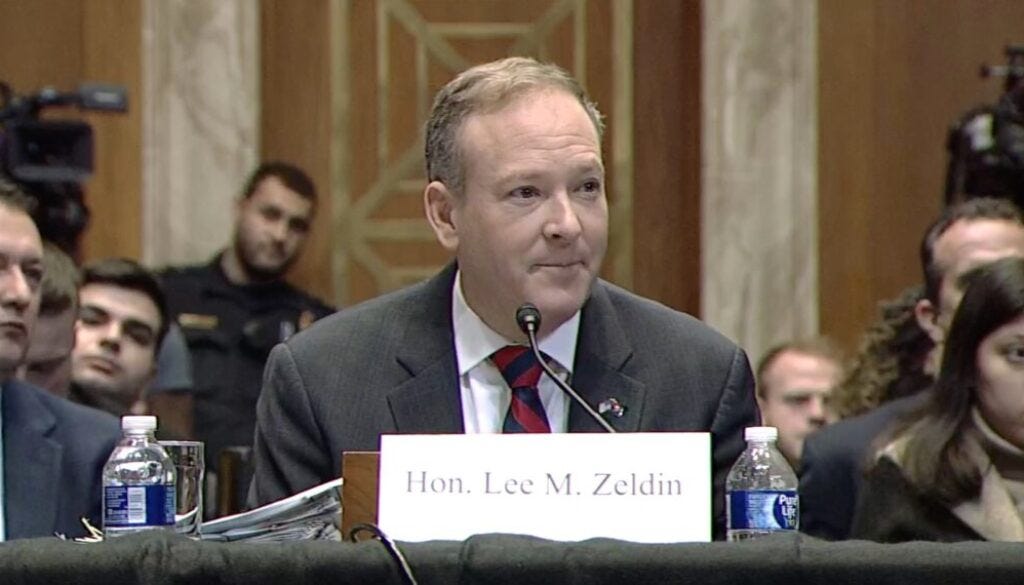Must-read recap: The New Lede's top stories
EPA's paraquat decision; new center to counteract polluters; Zeldin's hearing; "naturally grown" label; chemicals in drinking water; FDA bans Red Dye 3; PFAS in sewage sludge; clean energy advances.
EPA moves to withdraw decision on paraquat, delays report on risks
The Environmental Protection Agency (EPA) is moving to withdraw its interim regulatory decision on paraquat, announcing that it needs more time to examine the potential health effects of the weed killing chemical that has been widely used in agriculture for decades, but also linked for years to the incurable brain ailment known as Parkinson’s disease.
The EPA had promised to issue a report by Friday, January 17 updating its position on paraquat after a petition filed by the Michael J. Fox Foundation for Parkinson’s Research and several other health advocacy organizations challenged the EPA’s 2021 interim registration review decision in which the agency concluded that there was “insufficient” evidence linking paraquat exposure to Parkinson’s.
That interim EPA decision did call for certain mitigation measures to reduce risks the agency said it found necessary to protect human health and the environment, and labels on paraquat products were amended in 2022 to reflect those measures. But critics have pressed the EPA to go further and ban the pesticide entirely. (Read the rest of the story.)
Scientists cite disease “epidemic” in launch of new “Center to End Corporate Harm”
Citing an “industrial epidemic of disease,” a group of scientists have launched an organization aimed at tracking and preventing diseases tied to pollution and products pushed by influential companies.
The new “Center to End Corporate Harm” is based at the University of California San Francisco (UCSF), and will bring together scientists to develop strategies “to counter the destructive influence of polluters and poisoners,” according to a press release announcing the launch.
“Industries that produce health-harming products, including fossil fuels, plastics, petrochemicals, tobacco, and ultra-processed foods, have waged a decades-long assault on government regulatory agencies and policymaking to rig rules in their favor at the expense of public health. At the same time, these health harming products have contributed to a rise in chronic disease. We are working to change that,” the center states on its website. (Read the rest of the story.)
Lee Zeldin, Trump’s EPA nominee, pledges independence from industry ties in senate hearing
Incoming President Donald Trump’s nominee to lead the Environmental Protection Agency (EPA) appeared on track for confirmation after a Senate hearing Jan. 16 in which he pledged independence from industry money and influence.
Senators with the Committee on Environment and Public Works quizzed nominee Lee Zeldin, a former Congressman from eastern Long Island, on a wide range of issues, including his associations with, and financial ties to, the fossil fuel industry, his stance on government inducements for electric vehicle expansion, and environmental justice issues.
In one line of questioning, Sen. Sheldon Whitehouse, a Democrat from Rhode Island, pressed Zeldin on how he would “separate” his work at EPA from the demands of the fossil fuel industry, in particular. (Read the rest of the story.)
Certified “naturally grown” offers alternative to the USDA organic label
Illinois Country Harvest had been in Duensing’s family for generations when she took it over in 2015. She was new to farming, so there was a lot to learn about how to best manage the near-12 acres now under her purview. But one thing she definitely knew was that she wanted to manage the land, crops and animals without chemical inputs.
“We use absolutely zero chemicals, which means if we have pests, we don’t spray,” she said.
There are countless certifications she could have chosen and labels she could slap on her products to try and prove her farm has good practices. In the midst of rising consumer demand for organic foods, a nonprofit called “A Greener World” which “promotes practical, sustainable solutions in agriculture by supporting farmers and educating consumers” offers a 15-page guide that attempts to clear up consumer confusion around labels that use terms like “natural,” “humane” and “organic.” One of those labels, “Certified Naturally Grown”, seemed a perfect fit for how she was already running her farm. (Read the rest of the story.)
Millions of Americans exposed to unregulated chemicals in drinking water, study finds
Almost 100 million people in the US may be exposed to unregulated industrial chemicals in their drinking water, with communities of color especially at risk, according to a new analysis of federal monitoring data for water systems across the country.
The study, published Jan. 15 in the journal Environmental Health Perspectives, analyzed data gathered by the US Environmental Protection Agency (EPA) from 2013 to 2015 for four types of unregulated chemicals, finding that 27% of those nearly 5,000 public water systems had detectable levels of at least one contaminant.
Overall, more than 97 million US residents were served by a public water system with detectable levels of the contaminants examined in the study. (Read the rest of the study.)
FDA announces long-awaited ban on Red Dye 3
US regulators on Jan. 15 said a food additive long linked to cancer will no longer be allowed in food and drugs that are ingested, an action health advocates have demanded for years.
The Food & Drug Administration (FDA) is revoking the authorization for the use of what is known as Red Dye No. 3, a chemical used to give popular candies, cakes, cookies and other foods cherry-red colors.
The action comes in response to a 2022 petition filed by scientists and more than 20 public health organizations that pointed to studies finding the chemical causes cancer in laboratory animals. The petition cited a federal law that bars the FDA from allowing a color additive to be used in products that are ingested if the additive is found to induce cancer in “in man or animal.” (Read the rest of the story.)
PFAS in sludge spread on farmland poses health risks, EPA report says
US regulators on Jan 14. added to growing concerns about the long-standing practice of using sewage sludge to fertilize farmland, releasing a report warning that chemicals contaminating the sludge pose heightened human health risks for cancer and other illnesses.
The Environmental Protection Agency (EPA) said two types of hazardous per- and polyfluoroalkyl substances (PFAS) widely found in sewage sludge, a byproduct of wastewater treatment, can contaminate the milk, eggs and meat that come from farm animals raised on agricultural land where the sludge has been applied. Those “exposure pathways” are among multiple ways in which people can be at risk, the EPA said.
The agency focused on perfluorooctane sulfonic acid (PFOS) and perfluorooctanoic acid (PFOA), two well-studied types of PFAS chemicals linked to testicular and kidney cancer as well as liver problems. The EPA last spring designated PFOS and PFOA as hazardous substances under the so-called Superfund law and announced the first legally enforceable limits for the two chemicals and four other types of PFAS in drinking water. (Read the rest of the story.)
EPA boasts of clean energy advances as reversal threat looms
In the final week before Donald Trump takes office, federal regulators announced Jan. 13 that the Biden administration has awarded nearly $69 billion through two historic pieces of legislation designed to slash greenhouse gas emissions, lower energy costs, support the clean energy transition and help communities address pollution.
As of Jan. 6, the EPA had awarded 93% of grant funding made available by the Inflation Reduction Act (IRA), according to the new report. Biden signed the IRA in August 2022, with the administration calling it “the largest investment in clean energy and climate action ever.” The agency has awarded 82% of funding through the so-called Bipartisan Infrastructure Law (BIL), which passed in November 2021.
The report comes amid concerns that a Republican budget reconciliation bill could seek to reverse the IRA. A list of “spending reform options” reportedly distributed among House Republicans includes reversing $468 billion in Biden climate policies, which would entail repealing, among other measures, IRA green energy grants. (Read the rest of the story.)










